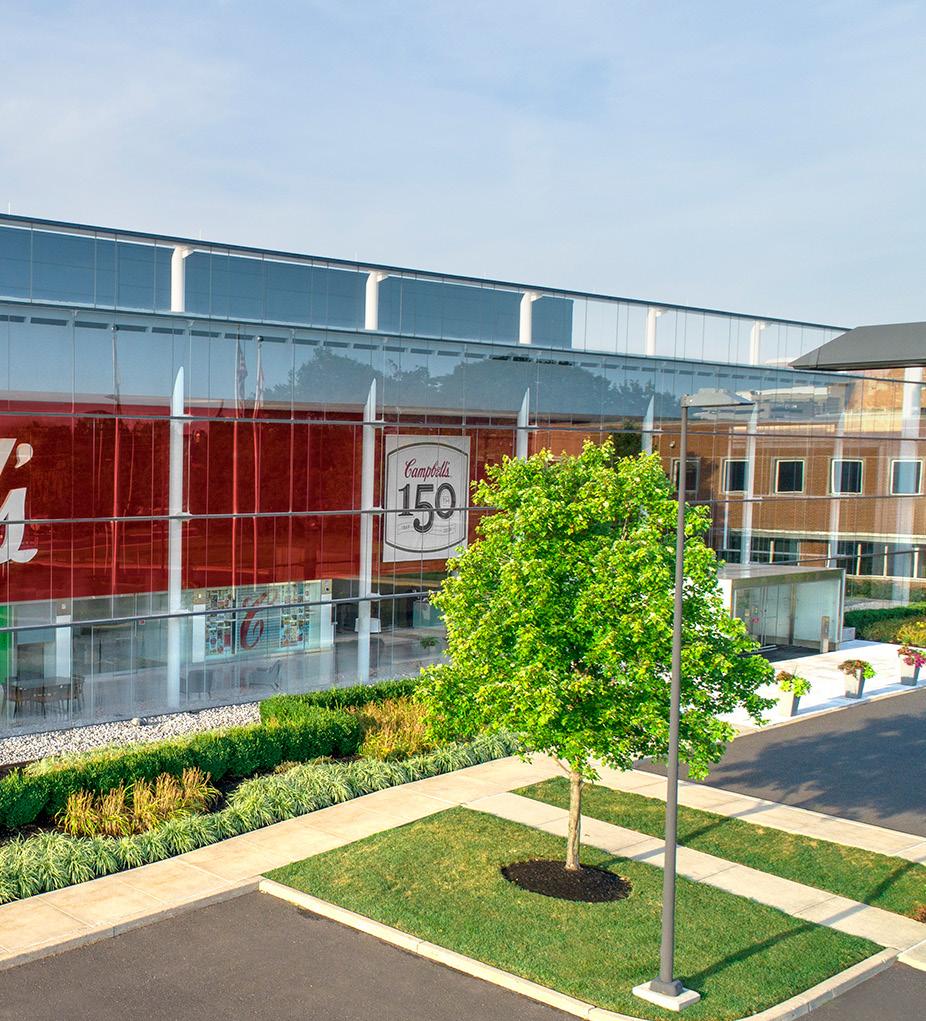





PROJECT PARTNER




With over 150 years of history,
The Campbell’s Company (Campbell’s) is on a mission to set new operational standards and connect people through food.
he company is made up of two divisions –Meals & Beverages and Snacks –and over 14,000 employees across North America. With a portfolio of 16 leadership brands, including Kettle Brand, Prego and Goldfish, Campbells has established itself as an industry powerhouse in the food industry.
Its success across its supply chain network and beyond is built up from the company’s ‘5 Cs’ – the key values that have shaped it across its extensive history:
Care: Caring about each other, its customers, its communities and the planet.
Character: Acting with integrity and transparency to execute with excellence and take accountability for its actions.
Collaboration: For Cambell’s, fostering inclusion and diversity leads to stronger teams and better results.
Competitiveness: The company is growth-minded, making bold decisions and moving fast to stay ahead of the curve.
Creativity: Continuously innovating, Campbell’ is always looking for solutions and improvements to the way it approaches challenges.
With these values in mind, the company is transforming its


approach to supply chain to increase production, promote growth and continue to establish itself as an industry leader.
At the centre of this supply chain evolution is an increased focus on operational excellence. The company is prioritising more efficient procurement processes, advanced logistics solutions and stronger planning systems.
In particular, one key initiative for the company’s improved operations is the recent adoption of integrated business planning (IBP), which is designed to align financial, supply chain and operational goals. With this, Campbell’s hopes to forecast demand more accurately, optimise inventory levels and improve production schedules.
The company’s production capabilities are undergoing significant modernisation in the coming years, with Campbell’s investing $230m to prioritise supply chain enhancements. Currently, the company is focusing on improving its manufacturing processes, with an increase in automation, optimised production and further integration of data analytics in its supply chain strategy.
As Campbell’s undergoes this transformation over the next few



Dart Express is a highly efficient, truckload solution providing HEAVY HAUL, EXPEDITED, DEDICATED, and TEAM-STYLE service to its customers.
We provide shippers with fast relay service along selected traffic lanes and our goal is to provide customers with unequalled service.
With a fleet designed around Ultralight Trailers and Ultralight Day Cab Tractors, Dart Express has 400 drivers, 1,100 trailers, and a relay domicile network to serve your needs.
We
• Consistent roundtrip lanes that allows DEX to build a dedicated network for any customer.
• Consistent one-way lanes that allows DEX to build a relay network through a collaborative effort with multiple customers: Dedicated service, one-way pricing!
• Backhaul lanes that fill and grow the existing relay network.
• Currently operating throughout the Eastern Half of the US.



“Campbell’s and California tomato growers have a long history of partnering on sustainability”
Stewart Lindsay, Campbell’s Chief Sustainability Officer
years, it hopes to enhance its ability to adapt to market changes and increase its production capabilities.
Beyond production, Campbell’s is also deploying this investment to improve its sustainability initiatives across its entire supply chain –through strategies such as waste reduction, improving energy efficiency and incorporating ecofriendly packaging in more of its products.
The company has been prioritising sustainable practice throughout its supply chain in recent years. Currently, Campbell’s is taking a closer look at responsible sourcing for the ten products it has identified as priority raw materials, in partnership with The Sustainability Consortium.
From potatoes to paper packaging, Campbell’s is ensuring that these products are carefully sourced to mitigate risks to the business and meaningfully impact the sustainability of its overall supply

chain. On a global level, this could reduce biodiversity loss, deforestation and poor water quality.
Recently, Campbell’s began a partnership with the Natural Resources Conservation Service (NRCS), American Farmland Trust and several other resource conservation districts to increase the adoption of sustainable agricultural practices by tomato growers in California – one of the company’s priority raw materials.
The project – supported with funding through the US Department of Agriculture (USDA)’s Regional Conservation Partnership Program – hopes to reduce agricultural greenhouse gas emissions, while building soil health, supporting water stewardship, and strengthening the profitability and resilience of tomato farms.
“Campbell’s and California tomato growers have a long history of partnering on sustainability,” says Stewart Lindsay, Campbell’s Chief Sustainability Officer. “As farmers






“We are grateful for the USDA’s support and look forward to working with our partners and growers on this important project”
face increasing challenges from climate change, it is important that we support further adoption of climate-smart agriculture practices that improve soil health and enhance resilience. We are grateful for the USDA’s support and look forward to working with our partners and growers on this important project.”
The company is also prioritising work with diverse suppliers to improve sustainable sourcing. It employs several strategies to pursue supplier diversity, including continued membership in both the Women’s Business Enterprise National Council, and the National Minority Supplier Development Council.
Image: thecampbellscompany.com

With a team of strategic sourcing analysts, Campbells utilises these councils’ resources to identify capable suppliers who align with the company’s mission and values. From there, Campbell’s leverages an internal database of prospective suppliers who have registered on its website to maintain a procurement-based supplier diversity working group.

This group of suppliers supports the company by informing strategic direction, providing feedback, identifying areas of opportunity and helping to improve existing processes. With this, Campbell’s has been able to build a supplier strategy shaped by a diverse team of people who acutely understand the changing face of supply chain operations.
With these initiatives in mind, Campbell’s is transforming its supply chain network to better cater to the future of the food industry. Armed with a forward thinking, innovative approach, the company is fostering its community and protecting the planet with the values that have guided it since 1869.
Learn more about Campbell’s here.
